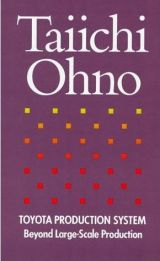


|
Toyota Production System: Beyond Large-Scale Production (精装)
by Taiichi Ohno
| Category:
Toyota Production System. Operations |
| Market price: ¥ 438.00
MSL price:
¥ 418.00
[ Shop incentives ]
|
| Stock:
Pre-order item, lead time 3-7 weeks upon payment [ COD term does not apply to pre-order items ] |
MSL rating:
 Good for Gifts Good for Gifts |
| MSL Pointer Review:
The book gives an excellent primer on the basic principles of JIT, work-flow, leveling, waste minimization, etc. and also covers the history and application of these philosophies at Toyota. |
| If you want us to help you with the right titles you're looking for, or to make reading recommendations based on your needs, please contact our consultants. |

|
| |
AllReviews |
1 Total 1 pages 6 items |
|
|
A reader (MSL quote), USA
<2007-06-21 00:00>
This is a short book and as such gets to the point. Explains difficult concepts in a simple way. This book explains how JIT, Kanban, Zero Defects came about. Also shows what is missing from American JIT and that is production leveling. |
|
|
A reader (MSL quote), USA
<2007-06-21 00:00>
After only reading a few pages of this book I could see that this Toyota has a lethal weapon in business that American companies seen not interested in using - or worse think that thay are using it just fine? Compare "TPS" with "My Years With General Motors" and imagaine who you would rather compete with? Demming said something like "export everything from America... except american management!" This book will show you why.
This book is not a "ISO" type blueprint in that it is a consise overview without much "filler" or stale requirements so don't worry if you donot get the big picture until you have read and maybe reread the book.
One note - I think that just maybe (if I can be so bold) that chapter 3 should be read first then the rest of the book. I also recomend other books (and web searches) on Kaizen by those who have done it for as long as Mr. Ohno.
I love this book! |
|
|
John (MSL quote), USA
<2007-06-21 00:00>
This book gives some real insight into the how the "Toyota Production System" actually gets results - not the mess you hear consultants preaching about on every street corner.
I think that to understand the "Toyota Production System," you need to understand that these guys were only trying to eliminate waste. 5-S, Kanban, Kaizen, Lean, Poka-yoke, SMED, and 1-piece flow were solutions to problems that they encountered when trying to get rid of the waste.
This is why the Consultant's shiny new silver bullet doesn't work for many companies - they just don't get it. The solutions listed above are ways to solve specific problems such as inventory losses, bad quality, long wait times, production bottle necks, etc... They aren't really "Methods" in themselves to analyze a problem... just the solutions they found effective. |
|
|
Hefty (MSL quote), USA
<2007-06-21 00:00>
I am a former Toyota Engineer and recommend that anyone interested in learning about the Toyota Production System a.k.a. lean manufacturing this is the place to start. Mr. Ohno is the creator of TPS and he gives a very good overview of how the system works. The book is very easy to read and easy to understand. This book should be read by all upper management employees looking to create a lean environment in their plants. The book will give you a good foundation to start implementing the techniques. It is the best book to read considering it comes from the inventor himself. It is the best you are going to find shy of being actually trained within Toyota's walls. |
|
|
Kodeman (MSL quote), USA
<2007-06-21 00:00>
There are lots of things we can learn from the Japanese. What I learned a lot from this book is the thought process that was behind developing there systems (just in time and "autonomation"). Knowing that they couldn't compete in the same methods as the Americans, the Japanese invented a system whose intent was to remove waste in all aspects of production. |
|
|
Motles (MSL quote), USA
<2007-06-21 00:00>
I really enjoyed reading Mr. Ohno's book. Even though it is a short book, it is full of ideas that can be applied to any production bussiness. Even though that the system was created for a car production facility, the concept of "waste" is useful to any type of manufacturing. This idea, coupled with the concept of producing exactly what is sold ( or what the client requests )allows any company to became profitable in times when profit margins get narrower and narrower. |
|
|
|
1 Total 1 pages 6 items |
|
|
|
|
|
|